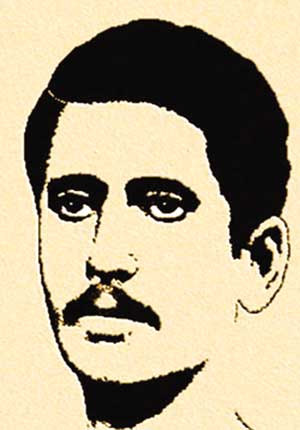Rajanikanta Sen (26 July 1865 – 13 September 1910) was a Bengali poet and composer, known for his devotional (bhakti) compositions, as well as his patriotic songs.
Contribution to Bengali music and literature
Rajanikanta's songs may be classified into four categories: Devotional (ভক্তি মূলক), Patriotic (দেশাত্মবোধক), Humanitarian (মানবধর্মী) and Satire (হাস্যরসাত্মক).
There was an assembly in Calcutta town hall on 7 August 1905 for protesting against Partition of Bengal. The boycott of British goods and using Swadeshi (Indian) items were decided by eminent Bengali leaders. Indian common men started using clothes manufactured in India. However, those were not so fine as compared to British ones. This made some of the Indians unhappy. In this context Rajanikanta wrote his famous song:
মায়ের দেওয়া মোটা কাপড় মাথায় তুলে নেরে ভাই;
দীন দুখিনি মা যে তোদের তার বেশি আর সাধ্য নাই ৷
My brothers, please accept the coarse clothing offered by your mother
As this is all your poor mother(nation) can afford
The song became popular across entire Bengal and so was Sen. The song was a major source of inspiration for the participants of the contemporary Swadeshi movement as well as for the Indian freedom fighters in the years to come. He wrote another popular song with similar intention:
আমরা নেহাত গরীব, আমরা নেহাত ছোট,-
তবু আছি সাতকোটি ভাই,-জেগে ওঠ !
We are extremely poor, we are extremely small
Yet we are seventy million brothers, rise up
Three books written by Rajanikanta were published in his life time; they were Bani (বাণী) (1902), Kalyani (কল্যাণী) (1905) and Amrita (অমৃত) (1910). Durgadas Lahiri in his encyclopedia of Bengali songs (বাঙালির গান), published in 1905, mentioned about Rajanikanta Sen:
"ইনি রাজশাহীতে ওকালতি করেন৷ বয়ঃক্রম প্রায় ৩২ বৎসর৷ বাণী এবং কল্যাণী নামক দুইখানি সঙ্গীত গ্রন্থ প্রণয়ন করিয়া ইনি যশস্বী হইয়াছেন৷ হাসির গান রচনায় ইনি সুনিপুন৷"
